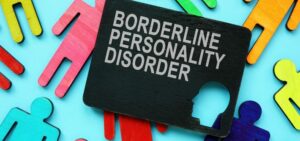If you have a friend or family member who suffers from Borderline Personality Disorder (BPD), then you know that dealing with them can be a roller coaster ride. Their emotions can change rapidly, and it can be difficult to understand what they are feeling at any given moment. In this blog post, we will discuss the borderline emotional reaction cycle in detail. We will also provide tips for how to deal with someone who is experiencing a BPD episode.
Contents
- 1 What Is Borderline Emotional Reaction Cycle?
- 2 How Person With BPD Feels?
- 3 What Causes Borderline Emotional Reaction Cycle?
- 4 Symptoms Of Borderline Personality Disorder
- 5 Is Borderline Emotional Reaction Cycle Permanent?
- 6 Healthy Relationships With BPD People
- 7 When To Get Help
- 8 How To Deal With Borderline Emotional Reaction Cycle?
- 9 Concluding Thoughts
- 10 A Word From Therapy Mantra
What Is Borderline Emotional Reaction Cycle?
 A borderline emotional reaction cycle is a pattern of behavior. That is characterized by extreme reactions to perceived threats of abandonment. These reactions can include anything from angry outbursts and self-harm to impulsive decisions and relationship problems.
A borderline emotional reaction cycle is a pattern of behavior. That is characterized by extreme reactions to perceived threats of abandonment. These reactions can include anything from angry outbursts and self-harm to impulsive decisions and relationship problems.
The cycle usually starts with a feeling of anxiety or insecurity, which leads to an intense emotional reaction. This reaction is then followed by feelings of guilt or shame. Which can lead to another round of anxiety and emotional reaction. The cycle continues in this way until the person with BPD feels secure again.
More often, the borderline emotional reaction cycle is really a series of small cycles. That happens over the course of a day or week. The length and intensity of each cycle can vary depending on the person and the situation. But, in general, the more stressors a person with BPD is facing, the longer and more intense their emotional reactions will be.
How Person With BPD Feels?
 When you have BPD, your emotions can be all over the place. You may feel happy one minute and then suddenly become angry or upset the next. This is because people with BPD often experience what’s called “mood swings.”
When you have BPD, your emotions can be all over the place. You may feel happy one minute and then suddenly become angry or upset the next. This is because people with BPD often experience what’s called “mood swings.”
However, there are three main types of emotions. That comes under borderline emotional cycle:
Each emotion has its own unique set of triggers and symptoms. And each one can play a role in the borderline emotional reaction cycle.
Anger is usually triggered by a perceived threat to oneself or to someone close to them. This could be anything from someone cutting them off in traffic to feeling ignored or unimportant. When someone with BPD feels threatened, they may lash out in anger. This can be verbal, physical, or both.
Anxiety is often triggered by uncertainty or a lack of control. This could be something as simple as waiting for test results or wondering if you made the right decision. When someone with BPD feels anxious, they may feel like they’re “going crazy” or that they’re about to die.
Sadness is usually triggered by loss or rejection. This could be anything from the death of a loved one to getting dumped by a partner. When someone with BPD feels sad, they may feel hopeless or worthless. They may also have thoughts of self-harm or suicide.
What Causes Borderline Emotional Reaction Cycle?
There are a number of reasons why people with borderline personality disorder (BPD) may react in this way.
One theory is that it’s the result of an “invalidating environment.” This means that people with BPD didn’t have their feelings and experiences validated when they were growing up. As a result, they don’t know how to validate themselves or others.
Another theory is that people with BPD have difficulty regulating their emotions. Because their brain chemistry is different from other people’s.
Studies have shown that people with BPD often have lower levels of the neurotransmitter serotonin than other people do. This can lead to impulsivity, aggression, and mood swings. Furthermore, people with BPD often have higher levels of the stress hormone cortisol.
Symptoms Of Borderline Personality Disorder

The symptoms of borderline personality disorder (BPD) can be divided into four main categories:
Impulsivity And Instability
This is probably the most well-known symptom of BPD. People with BPD are often impulsive, meaning they do things without thinking about the consequences first. This can manifest in risky behavior, like spending too much money, or in self-destructive behavior, like cutting oneself.
People with BPD are also often very unstable. This means that their moods can change very rapidly and for no apparent reason. They may be happy one minute and crying the next. This instability can make it very hard for people with BPD to maintain relationships.
Intense Fear Of Abandonment Or Rejection.
During the borderline emotional reaction cycle, people with BPD often experience intense fear of abandonment or rejection. This can lead them to do things like cling to others, or become extremely jealous.
However, this fear can also lead to self-destructive behavior, like sabotaging relationships before they have a chance to end.
Unstable Self-Image
More often than not, people with BPD have a very unstable self-image. This means that they see themselves as either all good or all bad. There is no middle ground.
This can lead to problems with decision-making. Because people with BPD often second-guess themselves. They may also have difficulty accepting compliments or positive feedback because it doesn’t fit with their view of themselves.
Frequent Displays Of Inappropriate Aggression
Generally, people with BPD have a very hard time controlling their anger. It can come out in explosive outbursts or in more subtle ways, like passive aggression. This anger is often disproportionate to the situation.
For example, someone with BPD may get angry over something small. Like a friend being five minutes late. Or they may react angrily to someone who they perceive as threatening or manipulative.
While these are some of the most common symptoms of BPD, It’s important to remember that everyone experiences the disorder differently. If you think you or someone you know may have BPD. Then seek professional help. Only a trained mental health professional can give a diagnosis.
Is Borderline Emotional Reaction Cycle Permanent?
 There is no easy answer when it comes to the question of whether or not the borderline emotional reaction cycle is a permanent condition. While it is certainly possible for people with BPD to learn how to manage their emotions. And live relatively normal lives. However, there is no guarantee that this will be the case for everyone.
There is no easy answer when it comes to the question of whether or not the borderline emotional reaction cycle is a permanent condition. While it is certainly possible for people with BPD to learn how to manage their emotions. And live relatively normal lives. However, there is no guarantee that this will be the case for everyone.
That being said, there are many treatment options available. And many people do find relief from their symptoms through medication, therapy, or a combination of both.
Furthermore, a borderline emotional reaction cycle is not a death sentence. And with the right treatment, many people are able to lead happy and fulfilling lives.
Healthy Relationships With BPD People
It is estimated that about of the population suffers from a borderline personality disorder (BPD. Making it one of the most commonly diagnosed mental disorders. Despite its prevalence, BPD is often misunderstood. One of the biggest misconceptions is that people with BPD are “crazy” or “dangerous.”
In reality, people with BPD are just like everyone else—they just have a little more trouble regulating their emotions. This can lead to some intense and challenging behaviors. But it doesn’t make them dangerous or unstable.
In fact, with treatment and support, many people with BPD go on to live happy and fulfilling lives. So, there are possibilities of establishing healthy relationships with BPD people. The borderline emotional reaction cycle is one such way. And, these cycles do not affect your relationship with the person suffering from BPD in a negative way.
When To Get Help
 If you are feeling like you are stuck in a never-ending cycle of emotions. It may be time to seek professional help. When things seem to be constantly escalating and you are struggling to cope. Then, you need to understand that it is time to get help.
If you are feeling like you are stuck in a never-ending cycle of emotions. It may be time to seek professional help. When things seem to be constantly escalating and you are struggling to cope. Then, you need to understand that it is time to get help.
However, there are some situations where you may not need professional help. If you are able to understand and cope with your emotions. Then, you may be able to manage borderline personality disorder on your own.
Situations Where You Must Ask Help
- Feel like you cannot control your emotions.
- Your emotions are impacting your work, school, or relationships.
- Have thoughts of self-harm or suicide.
Getting help for borderline personality disorder can be vital. In order to manage the condition and improve your quality of life. If you think you may need help. Do not hesitate to reach out to a mental health professional today.
Who Can Best Help People With Borderline Emotional Reaction Cycle?
There are various to get professional help. It is up to you what works best for you.
However, a therapist can help you understand your emotions better. And learn how to cope with them in a healthy way. If you are struggling to function in your day-to-day life. Or if your relationships are suffering, don’t hesitate to reach out for help.
There is no shame in seeking assistance from a qualified mental health professional. Remember, you deserve to live a happy and fulfilling life. Seek help when needed and do not be afraid to ask for support.
More often, there are other options as well. But, therapy could help you in a more significant way.
How To Deal With Borderline Emotional Reaction Cycle?
 When someone you love has a borderline personality disorder (BPD). It can feel as if you’re constantly walking on eggshells. Never quite sure what might trigger a negative reaction.
When someone you love has a borderline personality disorder (BPD). It can feel as if you’re constantly walking on eggshells. Never quite sure what might trigger a negative reaction.
The best way to deal with this is to try and understand the borderline emotional reaction cycle. This is a pattern of behavior that people with BPD often go through when they’re feeling overwhelmed or triggered.
However, there are ways to deal with a person having BPD. Here are some tips:
- Try to understand why the person is feeling this way. What might have happened to trigger this reaction?
- Offer support and encouragement. Let the person know that you’re there for them.
- Encourage positive coping mechanisms. This could include things like therapy, medication, or self-care practices.
- Avoid anything that might further upset the person or make them feel worse. This includes things like arguing, raising your voice, or making demands.
- Be patient. Dealing with BPD can be very difficult and it takes time to learn how to cope with it effectively.
These are some very general tips. But they can be helpful in dealing with someone who has BPD. If you’re struggling to cope, it’s important to seek professional help. This is the best way to ensure that you and the person you love are both getting the help and support you need.
Concluding Thoughts
Conclusively, the borderline emotional reaction cycle is a very real thing. And it can be extremely detrimental to one’s mental health. It is important to understand how this cycle works in order to deal with it in the most effective way possible. If you or someone you know is struggling with a borderline personality disorder. Please seek professional help.
Borderlines need validation from others in order to feel good about themselves. And when they don’t get it, they lash out. This can lead to a never-ending cycle of negative emotions that can be hard to break free from.
However, it is not always about negative emotions. Borderlines can also have moments of elation and happiness. The key is to find a balance and manage the emotions in a healthy way.
A Word From Therapy Mantra
Your mental health — Your psychological, emotional, and social well-being — has an impact on every aspect of your life. Positive mental health essentially allows you to effectively deal with life’s everyday challenges.
At TherapyMantra, we have a team of therapists who provide affordable online therapy to assist you with issues such as depression, anxiety, stress, workplace Issues, addiction, relationship, OCD, LGBTQ, and PTSD. You can book a free therapy or download our free Android or iOS app.
Reference Blog– https://therapymantra.co/therapy-types/equine-therapy/


